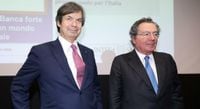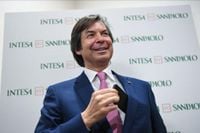On April 30, 2025, the Assembly of Intesa Sanpaolo marked a significant moment in the governance of Italy’s largest bank, confirming the leadership of Gian Maria Gros-Pietro as president and Carlo Messina as CEO for another three-year term. This renewal underscores the bank's commitment to stability and strategic continuity amid a rapidly changing economic landscape.
The shareholders’ meeting saw a decisive vote, with 57.3% of the shares present supporting the list proposed by the five main foundations of the bank, which included Compagnia di San Paolo, Cariplo, and CariFirenze. This list secured the election of 14 board members, reinforcing the management's solid track record over the past years.
Among the notable appointments was Paola Tagliavini, who made history as the first woman to be elected vice president of Intesa Sanpaolo. Her election is a landmark moment for gender representation in the upper echelons of the banking sector.
Additionally, the assembly welcomed Mariangela Zappia, the Italian ambassador to Washington, as a new board member. Zappia brings with her an impressive 40 years of diplomatic experience, including her roles as Italy's permanent representative to NATO and as the first woman to head the Italian Representation to the United Nations in New York.
Other new board members include Paolo Messa, a prominent figure in the Italian-American community and a seasoned editor, and Pietro Previtali, an esteemed academic from the University of Pavia. The board also retained several experienced members, including Luciano Nebbia and Franco Ceruti, ensuring a blend of continuity and fresh perspectives.
Messina, who has been at the helm since 2013, expressed gratitude for the trust placed in him and his team. "The first thought goes to the people of the Bank," he stated, reflecting on the importance of human capital in driving the institution's success. Under his leadership, Intesa Sanpaolo has emerged as a leader in shareholder returns, boasting a remarkable 259% increase in value over the past decade and distributing €34 billion in dividends.
In 2024, the bank reported a net profit of €8.7 billion, the highest in its history, showcasing its robust financial health. This performance is indicative of Messina’s commitment to balancing industrial objectives with social responsibility, a sentiment echoed by Lando Maria Sileoni, the general secretary of Fabi, who praised Messina’s leadership style as both modern and grounded in the realities of the Italian economy.
During the assembly, the shareholders also approved the financial statements for 2024, reinforcing the bank's transparent governance practices. The meeting, attended by 61.04% of the capital, also saw the approval of remuneration policies, setting the annual compensation for ordinary directors at €120,000, with additional fees for higher positions.
The new governance structure comes at a time when Intesa Sanpaolo is poised to play a pivotal role in the Italian and European economic landscape, particularly as it plans to invest €200 billion by 2028, with €40 billion earmarked for the Mezzogiorno region. This ambitious investment strategy aims to support both local and national economies, demonstrating the bank's commitment to fostering sustainable growth.
In his remarks, Gros-Pietro highlighted the importance of the bank’s role in a world increasingly characterized by geopolitical instability and economic uncertainty. He stated, "The world needs Europe to live up to its role more than ever," emphasizing the bank's responsibility to navigate these challenges effectively.
As the assembly concluded, the sense of optimism about the future of Intesa Sanpaolo was palpable. With a strong leadership team and a clear strategic vision, the bank is well-positioned to tackle the complexities of the current financial environment while remaining a cornerstone of support for families and businesses across Italy.
In summary, the renewal of leadership at Intesa Sanpaolo not only reflects a commitment to continuity but also signals a readiness to adapt and innovate in response to the evolving needs of the banking sector and its stakeholders. As Gros-Pietro and Messina embark on their new term, they carry with them the hopes of a banking institution that has consistently demonstrated resilience and a forward-thinking approach in the face of challenges.





